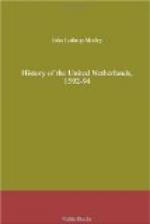But the chief mover of all things—so far as one man can be prime mover— was still the diligent scribe who lived in the Escorial. It was he whose high mission it was to blow the bellows of civil war, and to scatter curses over what had once been the smiling abodes of human creatures, throughout the leading countries of Christendom. The throne of France was vacant, nominally as well as actually, since—the year 1589. During two-and-twenty years preceding that epoch he had scourged the provinces, once constituting the richest and most enlightened portions of his hereditary domains, upon the theory that without the Spanish Inquisition no material prosperity was possible on earth, nor any entrance permitted to the realms of bliss beyond the grave. Had every Netherlander consented to burn his Bible, and to be burned himself should he be found listening to its holy precepts if read to him in shop, cottage, farm-house, or castle; and had he furthermore consented to renounce all the liberal institutions which his ancestors had earned, in the struggle of centuries, by the sweat of their brows and the blood of, their hearts; his benignant proprietor and master, who lived at the ends of the earth, would have consented at almost any moment to peace. His arms were ever open. Let it not be supposed that this is the language of sarcasm or epigram. Stripped of the decorous sophistication by which human beings are so fond of concealing their naked thoughts from each other, this was the one simple dogma always propounded by Philip. Grimace had done its worst, however, and it was long since it had exercised any power in the Netherlands. The king and the Dutchmen understood each other; and the plain truths with which those republicans answered the imperial proffers of mediation, so frequently renewed, were something new, and perhaps not entirely unwholesome in diplomacy.
It is not an inviting task to abandon the comparatively healthy atmosphere of the battle-field, the blood-stained swamp, the murderous trench—where human beings, even if communing only by bullets and push of pike, were at least dealing truthfully with each other—and to descend into those subterranean regions where the effluvia of falsehood becomes almost too foul for ordinary human organisation.
Heroes in those days, in any country, there were few. William the Silent was dead. De la Noue was dead. Duplessis-Mornay was living, but his influence over his royal master was rapidly diminishing. Cecil, Hatton, Essex, Howard, Raleigh, James Croft, Valentine Dale, John Norris, Roger Williams, the “Virgin Queen” herself—does one of these chief agents in public affairs, or do all of them together, furnish a thousandth part of that heroic whole which the England of the sixteenth century presents to every imagination? Maurice of Nassau-excellent soldier and engineer as he had already proved himself—had certainly not developed much of the heroic element,




